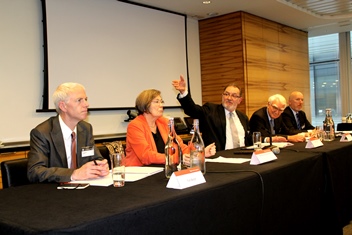Mark Steeves* says oil & gas, and mining, have done much to improve their transparency, but trust comes slowly - and more effort is needed.
 Picture:
Picture: The Panel. L-R: Author Tom Bergin (Reuters), Clare Short, Mark Steeves, Sir Mark Moody-Stuart (chair, Royal Dutch Shell Group 1998-2001, chair of Anglo American plc 2002-09, non-executive director of Saudi Aramco since 2007, and Society President 2002-04), Peter van Veen (Transparency International).
Photo: Ted Nield.
In April 2017 Geoscientist (27.3) reported on an event that took place on 21 February entitled: Trust & Transparency in the Oil & Gas and Mining Industries. It was organised by the City of London Geosciences Forum, an initiative of the Society’s Corporate Affiliates Committee aimed at building understanding between the Society and the City of London - especially those bankers, insurers, lawyers, Nomads, accountants, brokers, who depend upon the exploration activities of geologists for their business.
The Rt. Hon. Clare Short, former Labour MP for Birmingham Ladywood (1983-2010) and Secretary of State for the UK Department for International Development (DfID, 1997-2003) opened the meeting. As she explained, her interest in transparency, and her passion for international development had led to her becoming chair of the Extractive Industries Transparency Initiative (EITI, 2012-16).
In an overview of EITI since full establishment in 2006, Ms Short said that the issue of illicit financial flows had quickly risen to the top of the international agenda, where it remained. Of the $3.5 trillion annual gross revenue generated globally by extractive industries, an estimated $1 trillion is lost by producing countries through corruption, illegal resource exploitation and tax evasion.
Trump
While acknowledging that progress had been made, she noted one of President Donald Trump’s early “ominous” actions - to rescind the ‘Dodd-Frank’ provisions requiring extractive companies to report, country by country, what they pay to governments. She accused the American Petroleum Institute (API, and by extension, extractive industries at large, and therefore some in our audience) of having lobbied unrelentingly against those provisions. Some API members, she said, now “sit on the EITI Board - and thus the ramifications could be considerable”.
Ultimately, I think we learnt that our industry today (certainly at the high-end, and in the UK) is actually fairly transparent. Society President Malcolm Brown (Executive VP Exploration at BG until 2016) will have been pleased to hear Peter van Veen say that BG came top among oil and gas companies in Transparency International’s ‘Corporate Political Engagement Index’, which assesses the public reporting of the top 40 companies in the FTSE 100. Moody-Stuart defended Shell’s historic actions, in Nigeria, for instance, reasonably and pretty convincingly; robustly commending Shell’s commitment today to good governance and to EITI. He agreed that Short was rightly critical of API, and deplored US extra-territoriality.
Right thing
Peter van Veen asked – and answered - an obvious but pertinent question about beneficial ownership: “What does happen to the money, after it reaches government? It often ends up in countries where there are no beneficial ownership rules, where you can’t tell who owns assets. Ten percent of Westminster is owned by offshore vehicles from the British Virgin Islands. Why do we allow this? What good reason can there be not to be transparent?” Quite.
A delegate from our hosts, Norton Rose Fulbright, suggested from the floor that corporations couldn’t be blamed if resource-rich host governments are poorly served by their civil service. Clare Short, not interested in apportioning blame, asked rhetorically in reply: “Is it the company’s duty to do a ‘good’ deal, or not?”. Tom Bergin pointedly observed that companies don’t just ‘happen’ on situations, but conspire in creating them; citing the way North Sea bare-boat charters “are clearly structured artificially”. (My early career was spent chartering supply-boats, and I well remember how “imaginative” their ownership structures could be!)
We like to think we’ve done a lot to improve the way we do business, but much remains to be done. Even when we want a ‘good’ - by which I mean a ‘clean’ - deal, we often find ourselves facing competing and conflicting pressures. How ‘good’ is your agent, broker, adviser, operating partner, or legal advice? Consider the advantages of ‘having a good agent’ - and the almost total impracticality of not having one, in some countries. A ‘big brand’ company may have options often unavailable to young entrepreneurs and small businesses; but the big and powerful may not be agile, innovative or responsive - either to clients or civil society.
Mistrust
Public mistrust in the extractive industries, which in the mid-2000s led to EITI being created, has not noticeably diminished. And despite a large number of registrations for our event, the relatively low turnout might suggest that industry professionals and City firms supporting and serving the industry are either uninterested, think they know all there is to know and how to deal with the regulations, or both. Not good.
With the passing of time, it has become clear that this event raised as many questions, as it provided answers. In the future, the CLGF intends to hold more events that bear on what might most broadly be termed ethics, and the expectations and behaviour of the professions operating in and around extractive industries, as well as of the public.
• Clare Short’s full speech is available below. Editor
Author

* Mark Steeves is founder and director of Samphire & Associates Ltd. He is also a Friend of the Geological Society and sits on both the Corporate Affiliates Committee and the City of London Geoscience Forum Steering Committee.
Trust and Transparency in the oil & gas and mining industries
Delivered to: The City of London Geoscience Forum, Tuesday 21 February
 Clare Short
Clare Short
There have been a number of initiatives in recent years to encourage transparency in the extractive industries and root out corruption. It would be easy to conclude that the traditional link between the extractive industries, corruption and poor development outcomes have been addressed. Sadly this would be too optimistic a conclusion.
Phillipe Le Billon summarise the scale of the sector and its importance to developing countries in his paper of November 2011 on “Extractive sectors and illicit financial flows” for the respected U4 Anticorruption Resource Centre. Extractive sectors currently generate about 3.5 trillion US dollars in annual gross revenue, corresponding to about 5% of global GDP. The oil sector dwarfs other extractive sectors, accounting for about 65% of this overall figure, with coal and natural gas representing around 11% each, and other minerals 13%. Rents, or potential net revenues, are estimated at about $1 trillion for low income and the lower middle income countries, or about $200 per capita for a total population of 5 million. Much of this money is lost by producing countries as a result of illicit financial flows” ( my emphasis). He goes on to spell out that in extractive sectors, these flows mostly originate from corruption, Illegal resource exploitation and tax evasion.
It is worth reminding ourselves how comparatively recent have been in the efforts to prevent bribery and corruption in foreign contracting. Indeed it was not until 1996 that the OECD recommending that bribes paid to public officials abroad should cease to be tax deductible. And it was not until 2002 that the UK implemented this recommendation. The OECD treaty requiring countries to legislate to make corrupt payments to a public official abroad a criminal offence was not agreed until 1997, and legislation that adequately fulfilled the requirements of the treaty was not passed in the UK until 2010 - 7 years ago.
In December 2014 the OECD published an analysis the the cost of foreign bribery and corruption. The report analysed more than 400 cases worldwide involving companies or individuals from the 41 signatory countries of the the OECD Anti bribery Convention. Extraction was the largest sector with 19% of cases, followed by construction (15%). Bribes were promised or given most frequently to employees of state owned enterprises ( 27%), followed by customs officials. Heads of state and Ministers were bribed in 5% of cases but received 11% of total bribes. In most cases bribes were given to secure public procurement contracts. 6% of bribes were to obtain preferential tax treatment. (it should be noted that these figures arrive from cases that were caught and less than half of the countries concerned have adequate enforcement machinery but nevertheless they give a useful impression of the overall picture).
Obviously estimates of illicit financial flows cannot be precisely accurate but all agree they are very considerable The final report the AU/UN high-level panel on illicit financial flows from Africa published in 2015 estimating the illicit financial flows currently amount to $50 billion per year 60% which is due to an aggressive tax avoidance.
AS with bribery, it is only in recent years that concern has been expressed about resource wealth feeding corruption and conflict ; and in addition at the failure of vast oil and mineral resources to lead to sustainable development and the reduction of poverty. In the Cold War years Western governments major concern was security of supply, and company shared that concern together with an anxiety to secure their profits and avoid nationalisation. The World Bank and other investment institutions focused on the return on investment and not on the wider governance and social consequences of their investment in this sector.
Research evidence has been available since the founding of OPEC in the 1970s that, paradoxically, the discovery of oil and other natural resources tended to undermine and not improve poverty reduction and economic development. For a long time explanation focused on the problems of currency appreciation and fluctuations in revenues. But as early as 1975 the Venezuelan oil minister, who was a co-founder OPEC, said " I call petroleum the devils excrement, it brings trouble… waste, corruption… public services falling apart. And debt, debt we shall have for many years”. It was, again, only from the mid 90s onwards that the perverse outcome of oil extraction in developing countries came into the spotlight; this was because research identified bad governance as the driver behind very dismal development in resource rich countries.
The research suggested that oil and mineral rich states in the developing world were more likely to suffer from lack of provision of basic public goods, corruption, and civil war than and comparable non-resource rich countries; and are also more likely to be poorer. These findings were generally referred to as" the resource curse" and this is still a widespread reality. But countries like Norway and the UK in the case of oil and Canada and Australia in mining, are not so cursed ( though they may well have shared this experience historically - we have only to remember the history of coal in the UK ). It is clear therefore that the problem is governance not the nature of the resources themselves though it is true fluctuating prices, resource depletion and the likelihood of currency appreciation, do pose particular difficulties.
It is clear also that poor development outcomes are caused by the link between international and domestic factors ie the interaction between multinational companies and their shareholders and investors, host governments and greedy elites. The work of TI and the OECD Convention on Combating Bribery were important influences on public debate, as we were Global Witness reports on massive corruption in Angola. Global opinion turned against major companies, particularly oil companies and denounced their behaviour. The old slogan that “the business of business is business” was no longer acceptable.
The Publish What You Pay Coalition was formed initially from NGOs in the UK which has since spread to a worldwide movement. This led the Department for International Development to bring together companies, resource rich countries and NGOs to explore whether transparency might lead to better management of the sector. A process of consultation led to the establishment of the EITI just over 10 years ago. The idea was that governments should bring together companies and civil society to report openly, in accordance with EITI rules, on what companies paid to government and what government received. These figures were independently audited. The original idea that this simple transparency would prevent corruption was rather naive but some missing revenues were detected. But bringing together Government companies and civil society in countries were they had never sat down together did lead to a growth of trust and public discussion of the real issues causing misgovernance of the sector. In 2013 at the EITI Conference more demanding reporting was required and there was a new focus on reducing the EITI reporting requirements by entrenching transparency in government systems. It was also agreed that all 50 countries that are implementing the EITI will establish full reporting on beneficial ownership.
In addition to the challenges posed by the OECD Convention on Bribery, and initiatives such as the EITI the issue of illicit financial flows has recently pushed itself to the forefront of the international agenda. This has been triggered partly by an increased focus on the prevention of money laundering to fund terrorist organisations and also by public anger over tax evasion. In recent years the G8 and the G20 have urged progress on great transparency on company ownership and exchange of information in order to tackle tax evasion. It remains the case that every year huge sums of money are transferred out of developing countries illegally. While such practices occur in all countries– and are damaging everywhere - they are probably larger in scale in developing countries because their institutions are weaker. And the impact in poor countries is worse because there are less resources available for investment and to fund public services. Estimates of the scale of this problem very greatly but the OECD concludes that " there is a general consensus that the illicit financial flows likely exceed aid flows and investment in volume” The OECD Convention on Base Erosion and Profit Shifting ( BEPS ) provides for exchange of information so that tax is paid in the country in which value is added. This is surely a good development but countries tax system have to be reliable in order to qualify for exchange of information. It will take an enormous effort to ensure that developing country tax systems are improved enough to enable them to benefit from this initiative.
In conclusion I hope I have outlined the scale of the problem and the initiatives taken over the past 20 years to begin to tackle it. The question now is whether we will continue to make progress. Ominously, one of Trump”s early actions has been to ensure that the provisions that were included in the Dodd Frank legislation, to require all extractive companies to report country by country what they paid to governments, has been rescinded. The American Petroleum Institute has lobbied unrelentingly against this provision and now have got their way. Some of their members sit on the EITI Board and thus the ramifications could be considerable.